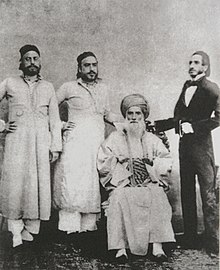 Prominent Bagdadi Jewish patriarch David Sassoon (seated) and his sons Elias David, Albert (Abdullah), and Sassoon David Sassoon | |
| Total population | |
|---|---|
| 50,000 in 1900 [1] | |
| Regions with significant populations | |
| India 100 (chiefly Mumbai and Calcutta) Israel, United Kingdom, Canada, Australia, Singapore, Hong Kong, and the United States. | |
| Languages | |
| Traditionally Arabic, Persian, Judeo-Urdu and Bengali. Now mostly English and Hebrew | |
| Religion | |
| Judaism |
Baghdadi Jews or Iraqi Jews are historic terms for the former communities of Jewish migrants and their descendants from Baghdad and elsewhere in the Middle East. They settled primarily in the ports and along the trade routes around the Indian Ocean and the South China Sea.
Beginning under the Mughal Empire in the 18th century, merchant traders from Baghdad and Aleppo established Judeo-Arabic speaking Jewish communities in India, then in a trading network across Asia, following Jewish customs.[2] These flourished under the British Empire in the 19th century, growing to be English-speaking and British oriented.[2]
These grew into a tight trading and kinship network across Asia with smaller Baghdadi communities being established beyond India in the mid-nineteenth century in Burma, Singapore, Hong Kong and Shanghai.[3][4] Baghdadi trading outposts were established further across Asia, and into Southeast Asia and Oceania, with families settling in Japan, Malaysia, Indonesia, and Australia.[5] Until the Second World War, these communities attracted a modest flow of Jewish emigrants from Iraq, with smaller numbers hailing from Syria, Egypt, Yemen, Iran, and Turkey.[6]
The Second World War brought strife to India, the Japanese occupation of Burma, Hong Kong and Shanghai, then swiftly the end of the British Empire in Asia. Dislocated by war, the violence of the Indian Partition, rising nationalism and the uncertainty of independence in both India and Burma, an exodus began to the newly founded state of Israel, United Kingdom and Australia.[2] Their old trade routes severed by first Communist victory in China, the ocean trade stifled in India and Burma by postcolonial nationalizations and trade restrictions, the Baghdadi Jews had emigrated almost in their entirety by the 1970s.[7] Families of Baghdadi Jewish descent continue to play a major role in Jewish life, especially in Great Britain where families such as the Sassoons and Reubens have enjoyed great prominence in business and politics.[8][9]
- ^ Cuinet, Vital (1894). La Turquie d'Asie (in French). Vol. 3. Paris. p. 66. Retrieved Jul 11, 2016.
{{cite book}}: CS1 maint: location missing publisher (link) - ^ a b c Cite error: The named reference
auto10was invoked but never defined (see the help page). - ^ "Calcutta", Jewish Virtual Library
- ^ Muzeon, Yisrael (1995). The Jews of India: A Story of Three Communities. University Press of New England. p.74. ISBN 965-278-179-7
- ^ Cite error: The named reference
:0was invoked but never defined (see the help page). - ^ "India virtual Jewish tour". Jewish Virtual Library. Retrieved 22 February 2015.
- ^ "The Rise and Fall of Calcutta Jews", The Forward
- ^ Collins, Damian (2016-06-02). Charmed Life: The Phenomenal World of Philip Sassoon. HarperCollins Publishers. ISBN 978-0-00-812761-9.
- ^ "Rabbi's Message" (PDF). www.kahaljoseph.org. Archived from the original (PDF) on 23 July 2018.